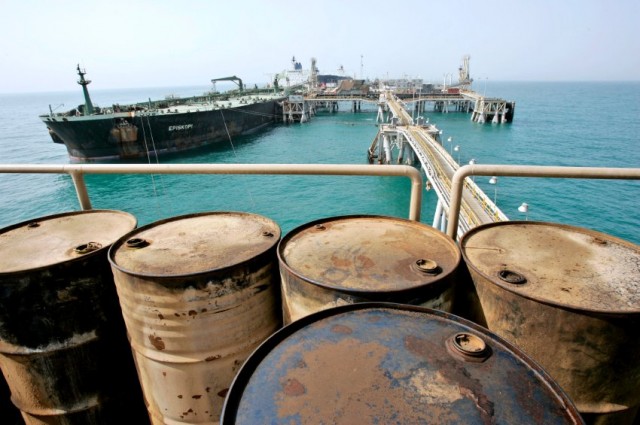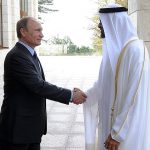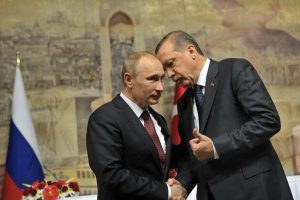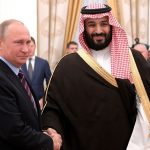by Paul R. Pillar*
Deliberations about imposing costs on Russia for undesirable behavior in Ukraine quickly run into several snags, among which is that any sanctions that would significantly hurt Russia would also hurt countries that impose them. Potential sanctions that immediately come to mind involve energy, given that exports of oil and gas provide Russia with nearly two-thirds of its export earnings and about one-half of its government revenues. But interference with those exports would also interfere with the energy supply of countries of the European Union, which get about one-third of their oil and gas from Russia. The United States, no matter how much shale it fracks, could do little to help, such as through exporting liquid natural gas (LNG).
A big elephant in the room in any discussion of oil and gas supplies is Iran. It has the world’s fourth largest oil reserves and is second only to Russia in reserves of natural gas. But of course we have been sanctioning the heck out of Iran, and the world does not have full and ready access to Iranian oil and gas, which the Iranian government would be happy to pump and sell lots more of. Admittedly, substitutions for European energy supplies cannot always be made quickly and easily, because of how distribution networks are laid out (in the case of gas) and refineries are set up (in the case of oil). Nonetheless, unshackling Iranian hydrocarbons would be one of the best medium-term solutions to any European energy pinch, whatever its cause. An existing pipeline to carry Iranian gas to Turkey could be the first stage in further distribution of that gas elsewhere in Europe. Such arrangements, in addition to any exports of LNG from Iran, would increase options and lower risk for the West in any sanctioning, or threat of sanctions, against Russia. Increased Iranian export of oil, which is a more globally fungible product with worldwide prices, would reduce Russia’s revenue because of downward pressure on the price of its oil, even without any sanctions.
The sanctions campaign against Iran, which has gone on so long with such automaticity that means have become confused with ends, has been carried out with little regard for the damage the sanctions inflict on our own interests. Now with the standoff against Russia over Ukraine, another form of such damage should be noted: the sanctions against Iran reduce our leverage against Vladimir Putin.
At the convergence of issues involving Russia and Iran, there has been misplaced fear about how any Russian weakening or evasion of anti-Iranian sanctions would supposedly weaken the West’s position in bargaining over Iran’s nuclear program. We ought to be worried instead about the opposite: that Russia might, in the interest of preserving its own export earnings and leverage in the energy sector, be tempted to screw up the negotiations so that sanctions stay in place and Iran is kept out of full participation in the oil and gas markets. Fortunately, so far Russia has not succumbed to any such temptation, evidently continuing to see that conclusion of a nuclear agreement with Iran would be in its own larger interests as well as everyone else’s.
The United States and its western partners already had good and strong reasons to see the negotiations through to a successful conclusion, especially because a negotiated agreement with Iran provides the best assurance that its nuclear program will stay peaceful. Now the impasse with Russia over Ukraine has provided an additional reason.
It is hard to try to wage economic warfare against two different adversaries at once. The United States should have learned that lesson when Thomas Jefferson imposed an embargo in 1807 on both Britain and France, thinking that this would get the two warring European powers to leave the United States alone. The embargo was a miserable failure, causing significant damage to the U.S. economy while having little desired effect on British and French behavior. Some things never change, even after growing to a superpower and becoming allies of the Europeans.
*This article was first published by the National Interest and was reprinted here with permission.






Goodness, out of the chaos, which the Neocons have plunged the U.S. into in foreign affairs, sober views are emerging, such as this currant post, IMHO. Whether “O” opens his eyes to the stupidity of continuing with this losing strategy, we will have to sit back and wait. Somehow, I don’t believe we will have to wait to long, nor for that matter, will the outcome be what the Neocons hope for. We may be witnessing the prelude to the biggest “Clusterfuck” known to the human race.
From the beginning, the whole rational for Iranian sanction was counterproductive and it only benefited the State of Israel and caused enormous financial and credibility damage to US and Europe. trillions of dollars were lost in energy and transportation and technology sector by closing the door on Iran with its huge market of 80 million people and rich natural resources. Now the irony is that the only country that can help US and Europe is Iran….Iran has always been the key to salvation of the West and is too important geographically (cross road of Asia/Europ/MiddleEast) and strategically to be ignored or sanctioned. West always used Iran when they needed them in Iraq or Afghanistan yet included them in “Axis of Evil” speech. Whoever that aligns itself with Iran will ultimately win the geostrategic game. Ironically through 30 years of heavy Western sanctions, Iran has maintained its independence without relying on either East or West…its time for EU and USA to wake up and reach out to Iran before Russia and the BRICS form a tighter union with Iran. The hypocrisy of Iranian Nuclear threat and false weapon program is coming to hurt the west as their back is against the wall now with alternative energy source once they decide to the take the poison pill and impose more sanction on Russian energy sector.